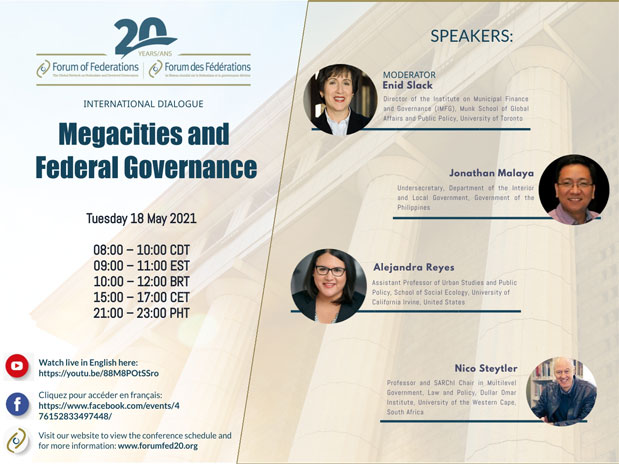
Join us, Tuesday, May 18th at 9:00am EST.
English: https://youtube.com/watch?v=88M8POtSSro
Français: https://facebook.com/events/476152833497448/
The 21st century has witnessed a rise in the number of cities that are home to more than 10 million people, commonly known as megacities. Currently, 12 percent of the world’s urban population lives in megacities – places such as Buenos Aires, Los Angeles, Mexico City, and Mumbai. Megacities are the same as metropolitan areas, which are urban agglomerations with a dense urban core and surrounding towns and villages that are dependent on it; their primary distinction with respect to other metropolitan areas is their size. Megacities are important generators of wealth, employment, and productivity growth and they are often the major engines of growth in their countries. Megacities often serve as regional hubs for people from nearby communities who come to work, shop, and use public services that are not available in their own communities.
Although more and more people are attracted to megacities because of the economic and social opportunities they offer, these very large cities face enormous and growing problems: transportation gridlock, inadequate affordable housing, widening income disparities, increased air and water pollution, the impact of climate change and, more recently, pandemics. These problems need to be addressed on a metropolitan-wide basis.
Yet, the governance of megacities is highly fragmented, and more so than for other cities, because of the large number of people and jurisdictions within their boundaries. Institutional fragmentation hampers the ability of megacities to coordinate services such as transportation and land use planning or economic development across multiple). Fragmentation also complicates policy coordination across the region, impedes revenue generation, and hampers the ability to redistribute income
As a result of this fragmentation and the scale of the challenges megacities face, everything that megacities do requires intergovernmental coordination and cooperation: megacity problems require multi-level solutions. This webinar will examine key topics in the evolving governance of megacities in federal systems, including: intergovernmental collaboration on issues affecting megacities; the balance between regional and local interests in the context of a megacity; and the powers and resources megacities need to meet the needs of the people which live in them.
For all details, please visit: www.forumfed20.org

